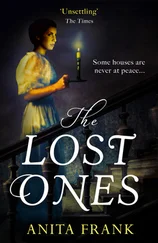She held a drink to him and said, “I hate these when they’re made too sweet.”
“Please — I got to leave, I really got to leave.”
He stood awkwardly in the shorts and white T shirt, one shoulder higher than the other, eyes moving swiftly from side to side, his vision moving across her at throat level, his throat bulging in an effortful, dry swallow, his hand reaching aimlessly behind him for the catch that would free the sliding panel.
He had a bony face, and not quite enough chin. His ears stuck out, and his upper lip was lugubriously long, and even at nineteen there were the beginning signs of how the brown-dark hair would recede. Poor lamb, she thought as she put the drinks on the nearby table.
She turned toward him, with pretty sigh, query in the tilt of head, moving so that he abandoned the escape place, trying to move casually away from her, with nervous social cough. She felt sad, wise, maternal and utterly gentle. Poor ordinary chick-child, scared almost sick of all the richnesses of maturity. Poor eagle-scout child, with its mama herding it relentlessly toward the ministry. Poor trembler, facing now the fleshy actuality, quite different from all those erotic little night-thoughts it fancied so evil.
“I really got to leave,” he said in the golden stillness, his voice unsteady.
“Of course, dear Oliver. I know.”
At Crissy Harkinson’s isolated and luxurious house on lower Biscayne Bay, the servant’s quarters were above the detached two-car garage and utility room. Crissy’s white Mercedes convertible was in one of the stalls. The vehicle of the young sailing instructor was parked in the turnaround area, inside the open vehicle gate, near the redwood fencing, a weary and solemn car, orange rust and blue paint.
Outside stairs were affixed to the side of the carport structure, leading up to a shallow open porch which ran the length of the building. Raoul Kelly sat placidly on the railing of the porch smoking a cigar and watching the sunset, waiting for Francisca to return. From there he could see a few glints of his own car beyond the fence where he preferred to leave it, some beetle-blue gleamings between the fence boards and the broad leaves of the outside plantings.
She came swiftly from the house, grinned up at him, waved, and came hurrying up the stairs, along the porch, gave him a quick hug, a little pat, and said, “It was an excellent guess. The working classes are given a little holiday. Until breakfast. And I think noon would be a very good guess for breakfast time.”
“He’s a little out of his class, ’Cisca. He’s overmatched.”
It was their practice for him to speak English and for her to respond in her brisk Cuban Spanish. Her understanding was far better than her ability to speak English.
She leaned against a nearby porch post, hands in the pockets of her vivid red skirt. She made a face. “It is a common thing, they say, for women of her age to covet strong young men, just as fat bankers seduce school girls. I feel like an accomplice, Raoul. She had me bring the fat worm and drop it right into the web. He seemed extremely nervous. And she had set the stage very shrewdly, and dressed appropriately.”
Sometimes, infrequently, he would detect in her voice some of the cadences and inflections of upper class pre-Castro Havana, the echo of yacht club, house parties, diplomatic functions.
She had been born to that world twenty-four years ago, and after the convent school and a proper marriage she would have become one of the chattering vivid young wives of Havana, all giggles and gossip and sideglance of flirtation, shopping at El Encanto and in Nassau, playing tennis and poolside bridge while the maids cared for the babies, flying to New York in the spring or the autumn with her husband. It was what the young Señorita Francisca Torcedo y Sarmantar had expected her life to be.
Had that world not changed, Raoul Kelly might even have met her there, but not as a social equal. Only child of a shop-keeper, he had been awarded a scholarship to Columbia University, had elected to enter the School of Journalism, had returned and gone to work on a Havana paper. He had heard of the Torcedo family, had not met them, knew that the wife had died as the result of a fall from a horse, knew that the father was so closely associated with Batista in certain business matters it would have been better for him to have left, as did so many others, before the bearded ones entered the city.
Later, after Raoul became a very good friend of the brother, Enrique Torcedo, during the training for the Bay of Pigs invasion, he had learned what had happened to the father. He had been too stubborn to leave. Those first days of the change of regime were days and nights of confusions, foolish acts, wildness. The papa had been clumsily and stupidly slain, not by one of the bearded veterans, but by a bewildered boy who just that day had been sworn into the militia and issued a rifle, and had thought only to threaten the man who had insulted him and the entire revolution. Francisca had disappeared at the time of the killing. Only much later it was learned what had happened to her. Crazed with grief and anger at the slaying of her father, she had run into the street with a tiny silver-plated woman’s pistol and punched two bee-sting wounds into the nearest uniformed peasant flesh. They had taken her away and placed her in the stockade at a provisional military barracks outside Havana at Rancho Luna.
Raoul knew that Enrique would never be convinced that those village boys were innocent of any depravity, any bestial intent. The new day had dawned, and here was this lithe and lovely and rebellious little upper class chicken, a bonus from the benign gods of revolution. Now that all were equal, she could be given her chance to labor for the glory of the people’s republic, to scrub and wash and cook and serve and carry and, inevitably perhaps, share the bunks of those young heroes of the revolution who, in turn, had the force to quell her and take her.
Once she was found, it was not difficult to arrange to have her brought out. The new Cuban Government was not eager for that kind of publicity. But there would be certain fees — and somehow they knew almost to a penny how much Enrique had managed to escape with, after everything else had been confiscated.
She was taken directly from Miami International to the hospital, dangerously thin, anemic, pregnant, alarmingly docile and submissive, and running a high fever of unknown origin. A bad reaction to the antibiotics they gave her caused her to miscarry. Old friends of the family competed for the chance to take her in and care for her. Perhaps conscience had something to do with it. During the final months of the Batista rule, they had been busily liquidating holdings and quietly and shrewdly shipping the money out of Cuba, investing it elsewhere. ’Cisca had nothing left, poor child, and she was a symbol of the brutality of the new order. And she is no trouble at all, really. Hardly says a word. The little thing just sits with her head bowed, sewing and knitting, and has that shy little smile when you speak to her.
During training Enrique had taken Raoul with him when he had made the last visit to his younger sister. He did not think she even glanced at him, or was more than remotely aware of another person present. It seemed to him then that the psychic damage had made her withdraw so far she would never return.
Apparently Enrique thought so too, because before the landing he asked Raoul to sort of watch out for ’Cisca should anything happen to him. Something happened. In the fumbled, sickening chaos of the Bay of Pigs, Raoul, diving for cover, saw Enrique run into a hammering rain that stopped him abruptly, then drove him back, emptied him, spilled him in a loose, wet, ragged ruin.
Читать дальше
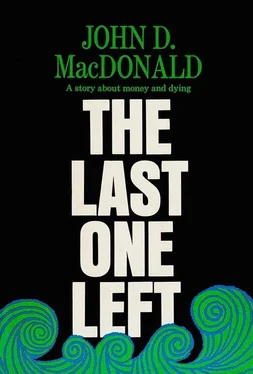

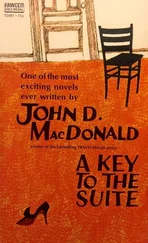
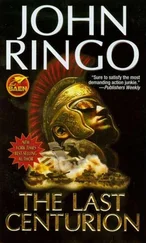


![Джон Макдональд - Wine of the Dreamers [= Planet of the Dreamers]](/books/430039/dzhon-makdonald-wine-of-the-dreamers-planet-of-thumb.webp)


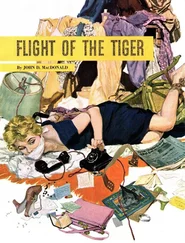
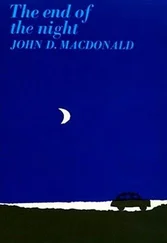
![Джон Макдональд - The Hunted [Short Story]](/books/433679/dzhon-makdonald-the-hunted-short-story-thumb.webp)
